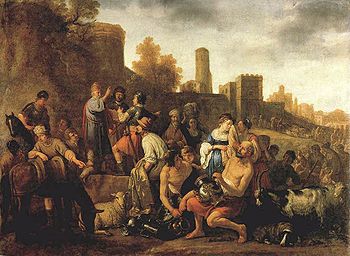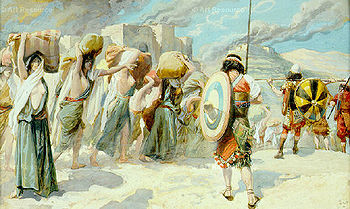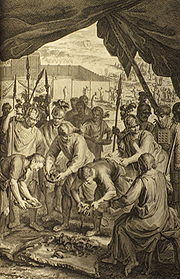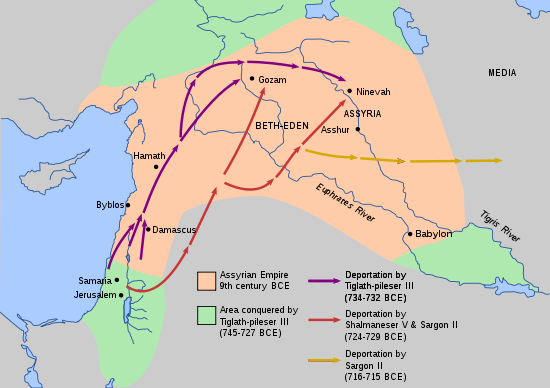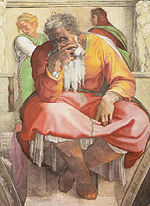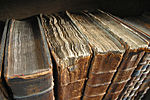- Matot
-
Matot, Mattot, Mattoth, or Matos (מַּטּוֹת — Hebrew for “tribes,” the fifth word, and the first distinctive word, in the parshah) is the 42nd weekly Torah portion (parshah) in the annual Jewish cycle of Torah reading and the ninth in the book of Numbers. It constitutes Numbers 30:2–32:42. Jews in the Diaspora generally read it in July or early August.
The lunisolar Hebrew calendar contains up to 55 weeks, the exact number varying between 50 in common years and 54 or 55 in leap years. In leap years (for example, 2011 and 2014), parshah Matot is read separately. In common years (for example, 2012, 2013, 2015, 2017, and 2018), parshah Matot is combined with the next parshah, Masei, to help achieve the number of weekly readings needed.
Contents
Summary
Vows
Moses told the heads of the Israelite tribes God’s commands about nedarim (commitments commonly translated, or perhaps mistranslated, as "vows"). (Numbers 30:2.) If a man made a vow to God, he was to carry out all that he promised. (Numbers 30:3.) If a girl living in her father’s household made a vow to God or assumed an obligation, and her father learned of it and did not object, her vow would stand. (Numbers 30:4–5.) But if her father objected on the day that he learned of it, her vow would not stand, and God would forgive her. (Numbers 30:6.) If she married while her vow was still in force, and her husband learned of it and did not object on the day that he found out, her vow would stand. (Numbers 30:7–8.) But if her husband objected on the day that he learned of it, her vow would not stand, and God would forgive her. (Numbers 30:9.) The vow of a widow or divorced woman was binding. (Numbers 30:10.) If a married woman made a vow and her husband learned of it and did not object, then her vow would stand. (Numbers 30:11–12.) But if her husband objected on the day that he learned of it, her vow would not stand, and God would forgive her. (Numbers 30:13.) If her husband annulled one of her vows after the day that he learned of it, he would bear her guilt. (Numbers 30:16.)
Vengeance on Midian
God directed Moses to attack the Midianites, after which he would die. (Numbers 31:1–2.) At Moses’ direction, a thousand men from each tribe, with Phinehas son of Eleazar serving as priest on the campaign with the sacred utensils and trumpets, attacked Midian and slew every man, including five kings of Midian and the prophet Balaam. (Numbers 31:3–8.) The Israelites burned the Midianite towns, took the Midianite women and children captive, seized all their beasts and wealth as booty, and brought the captives and spoil to Moses, Eleazar, and the Israelite community at the steppes of Moab. (Numbers 31:9–12.) Moses became angry with the army’s commanders for sparing the women, as they were the ones who, at Balaam’s bidding, had induced the Israelites to trespass against God in the sin of Peor. (Numbers 31:14–16.) Moses then told the Israelites to kill every boy and every woman who had had sexual relations, but to spare the virgin girls. (Numbers 31:17–18.)
Cleansing from battle
Moses directed the troops to stay outside the camp for 7 days after that, directed everyone of them who had touched a corpse to cleanse himself on the third and seventh days, and directed them to cleanse everything made of cloth, hide, or wood. (Numbers 31:19–20.) Eleazar told the troops to take any article that could withstand fire — gold, silver, copper, iron, tin, and lead — and pass them through fire to clean them, and to cleanse everything with water of lustration. (Numbers 31:21–23.) Eleazar directed that on the seventh day they should wash their clothes and be clean, and thereafter be free to enter the camp. (Numbers 31:24.)
Dividing the booty
God told Moses to work with Eleazar and the family heads to inventory and divide the booty equally between the combatants and the rest of the community. (Numbers 31:25–27.) God told them to exact a levy for God of one item in 500 of the warriors’ captive persons and animals to be given to Eleazar, and one in every 50 of the other Israelites’ captive persons and animals to be given to the Levites. (Numbers 31:28–30.) The total booty came to 675,000 sheep, 72,000 head of cattle, 61,000 asses, and 32,000 virgin women, which Moses and Eleazar divided as God had commanded. (Numbers 31:31–47.)
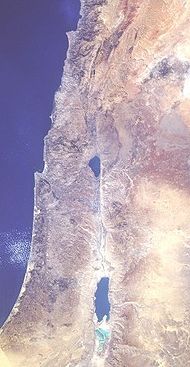 In this satellite image, the Jordan River appears near the center as a vertical line connecting the Sea of Galilee on the north with the Dead Sea on the south.
In this satellite image, the Jordan River appears near the center as a vertical line connecting the Sea of Galilee on the north with the Dead Sea on the south.
The commanders of the troops told Moses that they had checked the warriors, and not one was missing, so they brought as an offering to God the gold that they came upon — armlets, bracelets, signet rings, earrings, and pendants — to make expiation for their persons before God. (Numbers 31:48–50.) Moses and Eleazar accepted from them 16,750 shekels of gold, but the warriors in the ranks kept their booty for themselves. (Numbers 31:51–54.)
Land for the Reubenites and Gadites
The Reubenites and the Gadites, who owned much cattle, noted that the lands of Jazer and Gilead on the east side of the Jordan River suited cattle, and they approached Moses, Eleazar, and the chieftains and asked that those lands be given to them as a holding. (Numbers 32:1–5.) Moses asked them if the rest of the Israelites were to go to war while they stayed on the east bank, and would that not undermine the enthusiasm of the rest of the Israelites for crossing into the Promised Land. (Numbers 32:6–7.) Moses likened their position to that of the scouts who surveyed the land and then turned the minds of the Israelites against invading, thus incensing God and causing God to swear that none of the adult Israelites (except Caleb and Joshua) would see the land. (Numbers 32:8–12.) They replied that they would build their sheepfolds and towns east of the Jordan and leave their children there, but then serve as shock-troops in the van of the Israelites until the land was conquered and not seek a share of the land west of the Jordan. (Numbers 32:16–19.) Moses then said that if they would do this, and every shock-fighter among them crossed the Jordan, then they would be clear before God and Israel, and this land would be their holding. (Numbers 32:20–22.) But Moses continued, if they did not do as they promised, they would have sinned against God. (Numbers 32:20–22.) Moses instructed Eleazar, Joshua, and the family heads of the Israelite tribes to carry out the agreement. (Numbers 32:28–30.) So Moses assigned the Gadites, the Reubenites, and half the tribe of Manasseh lands on the east side of the Jordan. (Numbers 32:33.)
In classical rabbinic interpretation

Numbers chapter 30
Tractates Nedarim and Shevuot in the Mishnah, Tosefta, Jerusalem Talmud, and Babylonian Talmud interpreted the laws of vows in Exodus 20:7, Leviticus 5:1–10 and 19:12, Numbers 30:2–17, and Deuteronomy 23:24. (Mishnah Nedarim 1:1–11:11; Tosefta Nedarim 1:1–7:8; Jerusalem Talmud Nedarim 1a–; Babylonian Talmud Nedarim 2a–91b; Mishnah Shevuot 1:1–8:6; Tosefta Shevuot 1:1–6:7; Jerusalem Talmud Shevuot 1a–; Babylonian Talmud Shevuot 2a–49b.)
Rabbi Akiba taught that vows are a fence to self-restraint. (Mishnah Avot 3:13.) But the Jerusalem Talmud asked whether it was not enough that the Torah had forbidden us things that we should seek to forbid yet other things to ourselves. (Jerusalem Talmud Nedarim 9:1.) The Gemara discouraged vows. Rabbi Nathan taught that one who vows is as if he built a high place, and he who fulfils a vow is as if he sacrificed on that high place. And the Gemara deduced from Rabbi Nathan's teaching that is meritorious to seek absolution from vows. (Babylonian Talmud Nedarim 22a, 59a.) And a midrash told the tale of King Jannai, who owned two thousand towns, all of which were destroyed because of true oaths. A man would swear to his friend that he would eat such-and-such a food at such-and-such a place and drink such-and-such a drink at such-and-such a place. And they would go and fulfill their oaths and would be destroyed (for swearing to trifles). The midrash concluded that if this was the fate of people who swore truthfully, how much more would swearing to a falsehood lead to destruction. (Numbers Rabbah 22:1.)
The Mishnah taught that the law of the dissolution of vows hovers in the air and has nothing on which to rest in the Biblical text. (Mishnah Chagigah 1:8; Babylonian Talmud Chagigah 10a.) Rab Judah said that Samuel found the Scriptural basis for the law of the dissolution of vows in the words of Numbers 30:3, “he shall not break his word,” which teaches that “he” — the vower — may not break the vow, but others might dissolve it for him. (Babylonian Talmud Chagigah 10a.) The Rabbis taught in a Baraita that a Sage could annul a vow retroactively. (Babylonian Talmud Ketubot 74b.)
Rabbah bar bar Hana told of how an Arab merchant took him to see Mount Sinai, where he saw scorpions surround it, and they stood like white donkeys. Rabbah bar bar Hana heard a Heavenly Voice expressing regret about making an oath and asking who would annul the oath. When Rabbah bar bar Hana came before the Rabbis, they told him that he should have annulled the oath. But Rabbah bar bar Hana thought that perhaps it was the oath in connection with the Flood, where in Genesis 8:21, God promised never to destroy the world again with another flood. The Rabbis replied that if that had been the oath, the Heavenly Voice would not have expressed regret. (Babylonian Talmud Bava Batra 74a.)
Raba employed Numbers 30:3 to interpret Exodus 32:11, which says: “And Moses besought (va-yechal) the Lord his God” in connection with the incident of the Golden Calf. Raba noted that Exodus 32:11 uses the term “besought” (va-yechal), while Numbers 30:3 uses the similar term “break” (yachel) in connection with vows. Transferring the use of Numbers 30:3 to Exodus 32:11, Raba reasoned that Exodus 32:11 meant that Moses stood in prayer before God until Moses annulled for God God’s vow to destroy Israel, for a master had taught that while people cannot break their vows, others may annul their vows for them. (Babylonian Talmud Berakhot 32a.) Similarly, Rabbi Berekiah taught in the name of Rabbi Helbo in the name of Rabbi Isaac that Moses absolved God of God’s vow. When the Israelites made the Golden Calf, Moses began to persuade God to forgive them, but God explained to Moses that God had already taken an oath in Exodus 22:19 that “he who sacrifices to the gods . . . shall be utterly destroyed,” and God could not retract an oath. Moses responded by asking whether God had not granted Moses the power to annul oaths in Numbers 30:3 by saying, “When a man vows a vow to the Lord, or swears an oath to bind his soul with a bond, he shall not break his word,” implying that while he himself could not break his word, a scholar could absolve his vow. So Moses wrapped himself in his cloak and adopted the posture of a sage, and God stood before Moses as one asking for the annulment of a vow. (Exodus Rabbah 43:4.)
Rabbi Simeon ben Yohai taught that just as the texts “He shall not break his word” in Numbers 30:3 and “Defer not to pay it” in Ecclesiastes 5:3 apply to vows, so they also apply to valuations, and thus Moses exhorts the Israelites in Leviticus 27:7: “When a man shall clearly utter a vow of persons to the Lord, according to your valuation . . . .” (Leviticus Rabbah 37:2.)
The Mishnah taught that a father or husband could annul vows that involved self-denial, such as bathing and adorning oneself. (Mishnah Nedarim 11:1; Babylonian Talmud Nedarim 79a–b.) The Gemara deduced from the words “between a man and his wife, between a father and his daughter” in Numbers 30:17 that in addition to vows of self-denial, a husband could also annul vows that affected the relationship between husband and wife. (Babylonian Talmud Nedarim 79b.) And a midrash taught that just as a husband could annul only vows that would cause personal affliction between the spouses, so too, a father could annul only vows that would cause personal affliction between him and his daughter. (Midrash Tanhuma Matos 1.)
The Mishnah taught that in the case of a betrothed young woman, her father and her fiancé could annul her vows, if they both did so. If her father but not her fiancé attempted to annul her vow, or if her fiancé but not her father attempted to annul her vow, it was not annulled. And the Mishnah taught that it went without saying that her vow was not annulled if one of them confirmed it. (Mishnah 10:1; Babylonian Talmud Nedarim 66b–67a.)
Numbers chapter 31
A midrash deduced from the proximity of the report in Numbers 31:9 that “the children of Israel took captive the women of Midian . . . and all their cattle” with the report of Numbers 32:1 that “the children of Reuben and the children of Gad had a very great multitude of cattle” that God cast the Midianites down before Israel so that the Reubenites and Gadites might grow rich. The midrash cited this turn of events as proof of the words of Psalm 32:1 that “God is judge; He puts down one, and lifts up another.” (Numbers Rabbah 22:8.)
Numbers chapter 32
A midrash deduced from Numbers 32:1 that the Reubenites and Gadites were rich, possessing large amounts of cattle, but they loved their possessions so much that they separated themselves from their fellow Israelites and settled outside the Land of Israel. As a result, they became the first tribes to be taken away into exile, as 1 Chronicles 5:26 reports, “Tillegath-pilneser king of Assyria . . . carried . . . away . . . the Reubenites, and the Gadites, and the half-tribe of Manasseh.” (Numbers Rabbah 22:7.)
Similarly, a midrash taught that the Reubenites and the Gadites cherished their property more than human life, putting their cattle before their children when they told Moses in Numbers 32:16, “We will build sheepfolds here for our cattle, and cities for our little ones.” Moses told them that their priorities were wrong and that they should rather do the more important things first, when Moses told them in Numbers 32:24, “Build you cities for your little ones, and folds for your sheep.” The midrash saw in their different priorities application of the words of Ecclesiastes 10:2, “A wise man's understanding is at his right hand” — applying to Moses — and “A fool's understanding at his left” — applying to the Reubenites and the Gadites. God told the Reubenites and the Gadites that as they showed greater love for their cattle than for human souls, there would be no blessing in it for them. The midrash thus saw in their fate application of the words of Proverbs 20:21, “An estate may be gotten hastily at the beginning; but the end thereof shall not be blessed,” and the words of Proverbs 23:4, “Do not weary yourself to be rich; cease from your own wisdom.” (Numbers Rabbah 22:9.)
In the Mishnah, Rabbi Meir noted that Numbers 32:20 and 29 stated the same condition in both positive and negative formulations. Numbers 32:29 states the condition in the positive: “And Moses said to them, if the children of Gad and the children of Reuben will pass with you over the Jordan, . . . then you shall give them the land of Gilead for a possession.” And Numbers 32:20 states the same condition in the negative: “But if they will not pass over with you armed, then they shall have possessions among you in the land of Canaan.” Rabbi Meir deduced that every stipulation must be stated in both the negative and positive formulations, like the condition of the children of Gad and the children of Reuben in Numbers 32:20 and 29, or it is not a binding stipulation. Rabbi Hanina ben Gamaliel II maintained, however, that Moses stated the matter both ways because he needed to do so to be understood; otherwise one might have concluded that the Gadites and Reubenites would receive no inheritance even in the land of Canaan. (Mishnah Kiddushin 3:4; Babylonian Talmud Kiddushin 61a.)
The Sages taught in a Baraita that they honored the memory of the family that baked the Temple showbread, for they never allowed fine bread to be found in their children's hands. And the Sages honored the memory of the family that made the Temple incense, for they never allowed a bride of their house to go about perfumed. In both cases, the families did so to fulfill the command of Numbers 32:22 that “you shall be clear before the Lord and before Israel” — meaning that people should act so as to avoid even the appearance of transgression. (Babylonian Talmud Yoma 38a.)
Commandments
According to Maimonides
Maimonides cited a verse in the parshah for one negative commandment:
- Not to transgress in matters that one has forbidden oneself (Numbers 30:3.)
(Maimonides. Mishneh Torah, Negative Commandment 157. Cairo, Egypt, 1170–1180. Reprinted in Maimonides. The Commandments: Sefer Ha-Mitzvoth of Maimonides. Translated by Charles B. Chavel, 2:148–49. London: Soncino Press, 1967. ISBN 0-900689-71-4.)
According to Sefer ha-Chinuch
According to Sefer ha-Chinuch, there is 1 positive and 1 negative commandment in the parshah.
- The precept of the law of nullifying vows (Numbers 30:3.)
- That we should not break our word in vows that we make (Numbers 30:3.)
(Sefer HaHinnuch: The Book of [Mitzvah] Education. Translated by Charles Wengrov, 4:203–15. Jerusalem: Feldheim Pub., 1988. ISBN 0-87306-457-7.)
Haftarah
The haftarah for parshah Matot is Jeremiah 1:1–2:3. The haftarah is the first of three readings of admonition leading up to Tisha B'Av.
When parshah Matot is combined with parshah Masei (as it is in 2012, 2013, 2015, 2016, and 2017), the haftarah is the haftarah for parshah Masei:
- for Ashkenazi Jews: Jeremiah 2:4–28 & 3:4.
- for Sephardi Jews: Jeremiah 2:4–28 & 4:1–2.
Summary
The haftarah in Jeremiah 1:1–2:3 begins by identifying its words as those of Jeremiah the son of Hilkiah, a priest in Anathoth in the land of Benjamin, to whom God’s word came in the thirteenth year of the reign of Josiah the son of Amon as king of Judah, in the reign of Josiah’s son Jehoiakim, and through the eleventh year of the reign of Josiah’s son Zedekiah, when Jerusalem was carried away captive. (Jeremiah 1:1–3.)
God’s word came to Jeremiah to say that before God formed him in the womb, God knew him, sanctified him, and appointed him a prophet to the nations. (Jeremiah 1:4–5.) Jeremiah protested that he could not speak, for he was a child, but God told him not to fear, for he would go wherever God would send him, say whatever God would command him to say, and God would be with him to deliver him. (Jeremiah 1:6–8.) Then God touched Jeremiah’s mouth and said that God had put words in his mouth and set him over the nations to root out and to pull down, to destroy and to overthrow, to build and to plant. (Jeremiah 1:9–10.) God asked Jeremiah what he saw, he replied that he saw the rod of an almond tree, and God said that he had seen well, for God watches over God’s word to perform it. (Jeremiah 1:11–12.)
God’s word came to Jeremiah a second time to ask what he saw, he replied that he saw a seething pot tipping from the north, and God said that out of the north evil would break forth upon all Israel. (Jeremiah 1:13–14.) For God would call all the kingdoms of the north to come, and they would set their thrones at Jerusalem’s gate, against its walls, and against the cities of Judah. (Jeremiah 1:15.) God would utter God’s judgments against Judah, as its people had forsaken God and worshipped the work of their own hands. (Jeremiah 1:16.) God thus directed Jeremiah to gird his loins, arise, and speak to the Judean people all that God commanded, for God had made Jeremiah a fortified city, an iron pillar, and brazen walls against the land of Judah, its rulers, its priests, and its people. (Jeremiah 1:17–18.) They would fight against him, but they would not prevail, for God would be with him to deliver him. (Jeremiah 1:19.)
God’s word came to Jeremiah to tell him to go and cry in the ears of Jerusalem that God remembered the affection of her youth, her love as a bride, how she followed God in the wilderness. (Jeremiah 2:1–2.) Israel was God’s hallowed portion and God’s first-fruits, and all that devoured Israel would be held guilty and evil would come upon them. (Jeremiah 2:3.)
Connection to the special Sabbath
The first of three readings of admonition leading up to Tisha B'Av, the haftarah admonishes Judah and Israel in Jeremiah 1:13–19. And then in Jeremiah 2:1–3, the haftarah concludes with consolation. The Gemara taught that Jeremiah wrote the book of Lamentations (Babylonian Talmud Bava Batra 15a), and as Jews read Lamentations on Tisha B’Av, this probably accounts for why a selection from Jeremiah begins the series of haftarot of admonition. (Michael Fishbane. The JPS Bible Commentary: Haftarot, 262. Philadelphia: Jewish Publication Society, 2002. ISBN 0-8276-0691-5.)
Further reading
The parshah has parallels or is discussed in these sources:
Biblical
- Genesis 28:20–22 (vow).
- Exodus 20:7 (vows).
- Leviticus 5:1–10 (vows); 19:12 (vows); 27:1–25 (valuation of vows).
- Numbers 6:1–8 (vows); 10:1–10 (trumpets); 13:1–14:45 (the spies); 18:8–31 (sharing with the priests and Levites); 21:2 (vow); 25:16–18 (Midianites).
- Deuteronomy 3:12–20 (Reubenites and Gadites); 23:22–24 (vows).
- Joshua 1:12–18 (Reubenites and Gadites); 13:8–32; 22:1–34 (Reubenites and Gadites).
- Judges 6:1–7:25 (Midianites).
- 1 Samuel 1:11 (vow); 30:21–25 (division of booty).
- Psalms 9:13 (God avenges); 22:26 (paying vows); 37:29 (the righteous shall inherit the land); 49:12 (men call their lands after their own names); 50:14 (paying vows); 51:4 (washing); 66:13–14 (performing vows); 72:14 (value of lives); 94:1 (vengeance belongs to God); 106:28–31 (Peor); 116:15 (value of lives).
- Ecclesiastes 5:3–6 (vows).
Early nonrabbinic
- Josephus, Antiquities of the Jews 4:7:1, 3. Circa 93–94. Reprinted in, e.g., The Works of Josephus: Complete and Unabridged, New Updated Edition. Translated by William Whiston, 113–14. Peabody, Mass.: Hendrickson Pub., 1987. ISBN 0-913573-86-8.
- Matthew 5:33–37 (vows).
- Qur'an: 2:224–226; 5:89; 9:12–13; 16:91–92, 94; 66:2 (vows).
Classical rabbinic
- Mishnah: Chagigah 1:8; Nedarim 1:1–11:11; Gittin 4:7; Kiddushin 3:4; Shevuot 1:1–8:6; Avot 3:13. Land of Israel, circa 200 C.E. Reprinted in, e.g., The Mishnah: A New Translation. Translated by Jacob Neusner, 406–30, 492. New Haven: Yale University Press, 1988. ISBN 0-300-05022-4.
- Tosefta: Peah 4:15; Terumot 5:8; Nedarim 1:1–7:8; Sotah 7:17; Shevuot 1:1–6:7; Keritot 4:15. Land of Israel, circa 300 C.E. Reprinted in, e.g., The Tosefta: Translated from the Hebrew, with a New Introduction. Translated by Jacob Neusner, 1:73, 161, 785–805, 864; 2:1219–44, 1571. Peabody, Mass.: Hendrickson Pub., 2002. ISBN 1-56563-642-2.
- Jerusalem Talmud: Terumot 35b; Bikkurim 6a; Nedarim 1a–; Shevuot 1a–. Land of Israel, circa 400 CE. Reprinted in, e.g., Talmud Yerushalmi. Edited by Chaim Malinowitz, Yisroel Simcha Schorr, and Mordechai Marcus, vols. 7, 12. Brooklyn: Mesorah Publications, 2008–2011.
- Babylonian Talmud: Berakhot 8b, 24a, 32a; Shabbat 16b, 58b, 60a, 63b–64a, 157a; Eruvin 63a; Pesachim 13a, 66b; Yoma 38a, 63b; Moed Katan 9a, 16a; Chagigah 10a; Yevamot 29b, 53a, 87a–b, 93a, 108a; Ketubot 40b, 46b–47a, 49a, 52a, 57b, 59a–b, 60b–61a, 70a, 71a–b, 74a, 101a, 102b; Nedarim 2a–91b; Nazir 4b, 12b, 20b, 21b, 23a, 37b, 38b, 61a, 62b; Sotah 3a, 13b, 43a; Gittin 35b, 75a, 85a; Kiddushin 3b, 61a, 78a, 81b; Bava Kamma 25b, 61a; Bava Metzia 94a, 96a; Bava Batra 2b, 120b; Sanhedrin 39a, 90a, 106a; Makkot 11a, 16a; Shevuot 20a–21a, 26a; Avodah Zarah 67b, 75b; Zevachim 97a, 113b; Menachot 77b; Chullin 25b; Arakhin 20b; Temurah 6b, 13a; Keritot 6b; Niddah 46a–b. Babylonia, 6th Century. Reprinted in, e.g., Talmud Bavli. Edited by Yisroel Simcha Schorr, Chaim Malinowitz, and Mordechai Marcus, 72 vols. Brooklyn: Mesorah Pubs., 2006.
Medieval
- Rashi. Commentary. Numbers 30–32. Troyes, France, late 11th Century. Reprinted in, e.g., Rashi. The Torah: With Rashi’s Commentary Translated, Annotated, and Elucidated. Translated and annotated by Yisrael Isser Zvi Herczeg, 4:369–401. Brooklyn: Mesorah Publications, 1997. ISBN 0-89906-029-3.
- Numbers Rabbah 22:1–9. 12th Century. Reprinted in, e.g., Midrash Rabbah: Numbers. Translated by Judah J. Slotki. London: Soncino Press, 1939. ISBN 0-900689-38-2.
- Zohar 3:241b. Spain, late 13th Century. Reprinted in, e.g., The Zohar. Translated by Harry Sperling and Maurice Simon. 5 vols. London: Soncino Press, 1934.
Modern
- Samson Raphael Hirsch. Horeb: A Philosophy of Jewish Laws and Observances. Translated by Isidore Grunfeld, 276, 314–52. London: Soncino Press, 1962. Reprinted 2002 ISBN 0-900689-40-4. Originally published as Horeb, Versuche über Jissroel’s Pflichten in der Zerstreuung. Germany, 1837.
- Carol L. Meyers. “The Roots of Restriction: Women in Early Israel.” Biblical Archaeologist. 41 (3) (Sept. 1978).
- Jacob Milgrom. The JPS Torah Commentary: Numbers: The Traditional Hebrew Text with the New JPS Translation, 250–77, 488–96. Philadelphia: Jewish Publication Society, 1990. ISBN 0-8276-0329-0.
- Mary Douglas. In the Wilderness: The Doctrine of Defilement in the Book of Numbers, xix, 60, 86, 100, 103, 106, 108–10, 112, 120–21, 123, 126, 135, 141, 147, 160, 170–71, 183, 185–86, 199, 218, 222, 242. Oxford: Oxford University Press, 1993. Reprinted 2004. ISBN 0-19-924541-X.
- Baruch A. Levine. Numbers 21–36, 4A:423–507. New York: Anchor Bible, 2000. ISBN 0-385-41256-8.
- Suzanne A. Brody. “Gag Rule.” In Dancing in the White Spaces: The Yearly Torah Cycle and More Poems, 101. Shelbyville, Kentucky: Wasteland Press, 2007. ISBN 1-60047-112-9.
External links
Texts
Commentaries
- Academy for Jewish Religion, New York
- Aish.com
- American Jewish University
- Anshe Emes Synagogue, Los Angeles
- Bar-Ilan University
- Chabad.org
- eparsha.com
- G-dcast
- The Israel Koschitzky Virtual Beit Midrash
- Jewish Agency for Israel
- Jewish Theological Seminary
- Miriam Aflalo
- MyJewishLearning.com
- Ohr Sameach
- Orthodox Union
- OzTorah, Torah from Australia
- Oz Ve Shalom — Netivot Shalom
- Pardes from Jerusalem
- RabbiShimon.com
- Rabbi Shlomo Riskin
- Rabbi Shmuel Herzfeld
- Reconstructionist Judaism
- Sephardic Institute
- Shiur.com
- 613.org Jewish Torah Audio
- Tanach Study Center
- Teach613.org, Torah Education at Cherry Hill
- Torah from Dixie
- Torah.org
- TorahVort.com
- Union for Reform Judaism
- United Hebrew Congregations of the Commonwealth
- United Synagogue of Conservative Judaism
- What’s Bothering Rashi?
- Yeshiva University
- Yeshivat Chovevei Torah
Weekly Torah Portions Genesis Bereishit · Noach · Lech-Lecha · Vayeira · Chayei Sarah · Toledot · Vayetze · Vayishlach · Vayeshev · Miketz · Vayigash · Vayechi
Exodus Leviticus Numbers Deuteronomy Devarim · Va'etchanan · Eikev · Re'eh · Shoftim · Ki Teitzei · Ki Tavo · Nitzavim · Vayelech · Haazinu · V'Zot HaBerachahCategories:- Weekly Torah readings
- Book of Numbers
Wikimedia Foundation. 2010.


